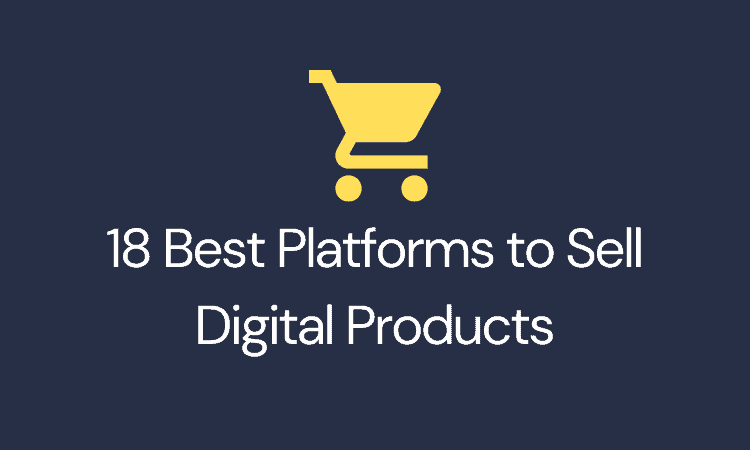Are you looking to sell digital products online, but unsure of which platform to use?
With so many options available, it can be difficult to determine which platform is a good fit for your business.
In this article, we will be discussing the top platforms for selling digital products, including their features, pricing, and ease of use.
Whether you’re a small business owner or an individual looking to monetize your digital creations, you’ll find a platform that fits your requirements after reading this article.
So, let’s dive in and discover the best platforms for selling digital products.
What Are The Best Platforms To Sell Digital Products In 2022?
Let’s take a look at the best platforms and marketplaces to sell digital products:
1. Sellfy.
Sellfy is a widely used and cost-effective platform for selling digital and physical products online.
It offers a variety of features that cater to the needs of modern business owners, making ecommerce simple and accessible to over 60,000 creators worldwide.
Whether you’re selling custom clothing, music, or digital downloads, Sellfy has you covered.
The platform’s visual builder allows you to set up your store quickly, with no coding experience required.
It also offers print-on-demand services and subscription-based models for selling products.
Popular features include multiple payment options, mobile optimization, shopping cart support, Patreon integration, analytics, and an easy-to-use visual builder.
Additionally, Sellfy’s pages are optimized for mobile devices, and it supports multiple languages and payment modes.
The pricing starts with a 14-day free trial, followed by paid packages starting at $19 per month, with custom quotes available for those earning over $200k in sales per year.
Sellfy also offers a 30-day money-back guarantee.
2. Podia.
Podia is a website specifically designed for selling digital goods online, from online courses to digital memberships.
It aims to replace a multitude of other products in your sales environment, such as email marketing and messaging tools, as well as building an online storefront.
Features include website building functionality, custom URL, free migration of existing content, support during the setup process, messaging for customer service, email marketing and drip campaigns, membership site support, and the ability to sell online courses and digital downloads.
Podia allows for customization of storefront and sales pages, and includes unlimited hosting, support for 11 languages and 22 currencies, and integration with Google Analytics and Facebook Pixel.
The pricing starts with a 14-day free trial, then $39 per month for the “Mover” package or $79 for the “Shaker” option.
They also have a free plan with access to most of their features and an 8% transaction fee.
Podia can be used to sell digital products, online courses, webinars and membership subscriptions.
3. BigCommerce.
BigCommerce is a widely used ecommerce platform that offers a variety of features for businesses of all sizes.
Its powerful product discovery search engine is particularly beneficial for larger retail brands, but it can also be beneficial for smaller companies and digital sellers.
With built-in features that eliminate the need for multiple tools and plugins, BigCommerce simplifies the process of running an online business.
Some of the features include a customizable website builder, support for those without coding knowledge, a flexible and scalable design, brick-and-mortar store support, built-in SSL security, options to choose your own domain, multiple payment options, and support for multi-channel selling.
Additionally, BigCommerce offers tools for abandoned cart recovery, real-time analytics and reporting, and built-in marketing tools.
You can try BigCommerce for free, and then the lowest-paid plan starts at $29.95.
Keep in mind that more advanced features may require more expensive packages.
BigCommerce supports most types of selling, but it is not the best option for building online courses.
4. Thinkific.
Thinkific is an ecommerce platform that specializes in online education and course creation.
It enables users to create a branded platform for sharing their knowledge and expertise, with over 40,000 course creators and 30 million courses taken on the platform.
Thinkific offers a range of features including a custom domain and URL, SSL certificate for security, font and language control, white labeling for branding, support for various media types such as audio, video and PDFs, exam-based lessons with certifications, and assignments for individual students.
It’s a comprehensive solution for creating and selling online courses, with a drag-and-drop editor that allows for customization of quizzes, text style, and integration with Google Docs.
Pricing options include a free plan for the first course, and a 30-day money-back guarantee.
Advanced features require at least the Start package for $99 per month, or the Grow package for $149 per month with no transaction fees and annual discounts available.
Thinkific is best suited for selling online courses, rather than other digital downloads.
5. Payhip.
Payhip is a popular e-commerce platform that is used by over 130,000 sellers worldwide.
It offers a wide range of options for selling digital products, including ebooks, memberships, software, and music.
The platform’s customer store pages may be limited in terms of customization, but it has a layout similar to Pinterest.
However, if you run your own blog, website, or plan to sell directly on social media, Payhip makes it easy to embed the checkout and shopping cart, which can be customized to match your branding.
The checkout is also responsive, allowing customers to make purchases on any device.
Payhip offers several useful features, including the ability to create your own affiliate program, add discounts or coupons to products, and run promotional campaigns.
Additionally, it allows for limited downloads and offers license keys for software, as well as PDF stamping to prevent illegal sharing.
The platform also supports selling memberships with multiple plans and recurring intervals, and it can sync your customers to your mailing lists.
The best thing about Payhip is that all the features are available on each plan and they have a free plan.
Sales are deposited immediately after each sale, and buyers can choose a variety of payment methods, including PayPal or Stripe, or they can use their own credit or debit card.
Payhip supports a wide array of currencies and accepts payments in multiple languages.
Pricing: Each plan comes with all features and unlimited products, with the only difference being the transaction fee.
With the Free Forever plan, there’s a 5% transaction fee, but if you upgrade to the Plus plan, it goes down to 2%.
And if you upgrade to the Pro plan, there’s no transaction fee at all!
PayPal/Stripe fees still apply.
6. SendOwl.
SendOwl is an e-commerce platform that specializes in selling digital products.
It is designed to be user-friendly, making it a good option for beginners who are just starting in the digital world.
One of the main features of SendOwl is that it can integrate with any website, allowing you to implement the service into your Shopify or WordPress site and begin selling digital products without having to start from scratch.
Other features of SendOwl include an extensive marketplace for add-ons and extensions, advanced user capabilities, discount codes and promotional offers, advanced reporting and analytics, an affiliate program, and API access.
The checkout is also responsive for mobile, and there are multiple payment options including Bitcoin.
Additionally, you can sell your digital products to customers anywhere, even through email signatures and social media posts.
Pricing for SendOwl starts at $15 per month for the standard plan, or you can upgrade to the Premium plan at $24 per month or the Business plan at $39 per month.
There is also a “basics” option for $9 per month and all plans begin with a 30-day free trial.
The only thing you can sell on SendOwl is digital products.
7. Gumroad.
Gumroad is a software solution that focuses on supporting creators of all kinds, such as artists, writers, educators, podcasters, and more.
It aims to make it easy for creators to get paid for their work, whether it be books, comics, music, or other forms of digital and physical products.
It’s free to start using Gumroad and it accepts a variety of payment types, but it’s important to note that most payments come with an additional charge.
The software offers a range of features, including an affiliate center, easy-to-use video hosting, gated content, customizable checkout pages, and more.
Additionally, it also provides options for generating license keys for selling software, creating discounts and coupons, and managing affiliate marketing.
Pricing: 10% per transaction + processing fees.
What can you sell with Gumroad? Digital products, physical products, subscriptions, and pre-orders.
8. Teachable.
Teachable is a widely used ecommerce platform for selling online courses.
It offers a user-friendly interface and a range of tools to help you sell your courses effectively.
Some of the features include: website customization options, support for multiple teaching media, quizzes and course completion certificates, student feedback and support integrations, student list segmentation, promotions and coupons, advanced pricing options, built-in affiliate program, customizable sales pages, and support for conversion pixels.
Teachable also allows you to track your entire customer journey by integrating with tools like Google Analytics and MailChimp.
The pricing for Teachable starts at $39 per month, with an option to pay $29 per month if you choose the annual payment option.
You will also pay 5% transaction fees on the lowest tier, but these fees are eliminated when you upgrade.
Note that Teachable is only suitable for selling online courses and learning subscriptions, and not for selling digital downloads.
9. Shopify.
Shopify is a widely-used ecommerce platform that allows businesses to sell a variety of products, including physical and digital items.
It is known for its easy-to-use interface and customizable options to fit your brand’s needs.
The platform offers a free trial and supports mobile commerce, unlimited bandwidth and hosting, and has access to various plugins and extensions.
Additionally, Shopify has marketing features, email access, and abandoned cart recovery.
You can also sell subscriptions and digital downloads through third-party apps or integrations.
Pricing starts at $29 per month, with various options for more advanced features.
Shopify is suitable for selling everything from physical products to subscriptions.
10. MemberPress.
MemberPress is a WordPress plugin that enables you to sell paid memberships on your website.
It allows you to restrict access to certain digital goods, such as subscriptions and VIP accounts, based on a user’s membership level.
This plugin also integrates with WooCommerce, so you can enhance the functionality of your online store without the need for an external payment system.
Key features of MemberPress include: powerful and easy-to-use functionality, membership subscription tracking, integration options, support for various payment methods, and compatibility with WordPress and WooCommerce.
Additionally, MemberPress offers affiliate support and multiple membership options to choose from, allowing you to manage members and grant or revoke access to digital goods at your discretion.
Pricing starts at $179/year, with additional plans offering extra functionality.
MemberPress is best suited for membership site offerings and integrating with learning management systems to deliver online courses.
11. EasyDigitalDownloads.
EasyDigitalDownloads is a plugin designed specifically for WordPress, the most popular blogging platform.
It offers a full-fledged ecommerce solution for selling digital products through your WordPress blog, with a focus on simplicity and ease-of-use.
It provides just the features you need to sell digital downloads, without attempting to offer every feature under the sun.
This platform is ideal for software developers and those looking to sell software online.
Prices start at $99.50/year, with additional options for subscriptions and licensed software. Additional useful extensions can be purchased for $499.50/year.
12. E-junkie.
E-junkie is a widely used ecommerce platform that has gained popularity over the past decade for its flat monthly fee structure.
It is particularly popular among creative professionals who sell digital items such as books, themes, and graphics work, as well as those who sell services in areas like marketing and business.
The platform itself manages everything, from purchase validation to immediate file downloads for users.
E-junkie also offers an affiliate program, allowing users to increase sales through website and blog owners.
Features include inventory management, analytics, and more.
The platform starts at $5/month for selling up to 10 digital products and $40/month for an unlimited plan with no file size or product limits.
13. FastSpring.
FastSpring is a platform that can help software companies with online sales.
It is a comprehensive solution that handles the selling process.
It offers features such as global payments, subscriptions, branded checkout, global taxes, and integrations with other platforms.
Companies can request a demo to see how FastSpring can benefit their business before committing.
Pricing is based on the size of the business and custom quotes are available upon request.
14. DPD.
DPD is a platform that allows you to sell a variety of digital products such as software, eBooks, themes, music, and graphics.
Instead of handling the sales process yourself, you can upload your files to DPD and it will handle the rest.
The platform allows you to add a “add to cart” button to your website, blog, or Facebook page and integrates with over 500 marketing tools.
DPD has a safe and quick checkout process that lets customers make purchases quickly and easily and have the funds deposited directly into their accounts.
DPD also delivers the files to customers without any further action required from you.
With DPD, you can start selling your digital products right away.
Prices start at $10/month for up to 20 products, with payment processing fees included.
15. ClickBank.
ClickBank is a well-established platform for buying and selling digital goods.
It has a large customer base that is always looking for new and unique products in their specific market.
The platform’s affiliate program is known for generating substantial revenue for those who take advantage of its promotional tools.
Many of the products available on ClickBank focus on teaching internet marketing strategies, particularly email marketing and organic promotion techniques.
The platform’s pricing model includes an initial listing fee of $49.95, followed by a 7.5% + $1.00 charge per sale.
While it may seem pricey, the platform offers good exposure through its marketplace and affiliate partners.
16. PayLoadz.
PayLoadz is a well-established platform with over a decade of experience in the digital goods market.
It boasts a large community of sellers, with over 600,000 individuals and 3,500,000 items.
The platform allows users to launch their own sales pages in minutes, and can accommodate a wide range of digital products, such as photographs, eBooks, and video games.
PayLoadz offers valuable advice and insights to its users based on its extensive knowledge of the digital goods market.
The platform offers a free option for sellers, however, it charges a 30% transaction fee.
The regular pricing for PayLoadz is $29, which provides unlimited flexibility at no additional cost.
17. Creative Market.
Creative Market is a marketplace that features the work of over 10,000 artists, including designers and developers.
The platform allows anyone to become a seller, but they must go through a rigorous approval process.
Once approved, sellers can showcase their unique and beautiful work to hundreds of thousands of monthly visitors, who come to the platform to find things like unique photography, graphics, templates, and content management system themes.
There are no initial setup fees, but sellers are required to pay a 40% transaction fee.
18. Envato Market.
Envato is a hub for eight expansive digital marketplaces, including well-known platforms ThemeForest and Codecanyon, that have collectively generated millions in revenue.
With over 5 million unique products, Envato provides customers with everything they need to turn their ideas into reality without having to hire separate individuals for custom work.
The platform also receives millions of monthly visitors, increasing the chances of making sales as long as the product meets the required standards.
Envato also offers an attractive affiliate program, which is heavily advertised by bloggers.
Pricing: There is no initial setup fee but all products must be approved before they can be sold.
For non-exclusive authors, a 55% fee applies, while exclusive authors have a fee ranging from 12.5% to 37.5%, which decreases as sales increase.
Although it is more expensive than other platforms, Envato’s vast exposure through its marketplace makes it worth considering.
19. Selz.
Selz is a sleek and sophisticated platform for selling digital goods that can easily blend with any website design.
With Selz, you can create a visually appealing store and integrate “Buy” buttons onto your website and social media pages.
You can manage your customers, orders, and handle payment processing all in one place.
Price: Selz offers a free plan that allows you to list up to 5 products, with a 5% success fee for each item sold.
For professional plans, there are no additional fees, only a monthly cost of $27 plus credit card processing fees.
20. Sellwire.
SellWire is a platform that specializes in the sale and purchase of digital products and services.
Established in 2014, it offers all the necessary features for a successful transaction.
With SellWire, you can offer various file formats such as PDFs, MP4 videos, CAD files, and more, to cater to your customers’ needs.
The platform utilizes PayPal as its payment method, a globally popular option that accepts both credit cards, debit cards, and bank accounts.
The payments are straightforward, as the funds are directly transferred to your PayPal account without any international fees, depending on your chosen payout method.
21. Simple Goods.
Simple Goods is a full-service platform established in 2012, which offers support for digital goods.
With a strong customer service team, Simple Goods has served over 100,000 businesses globally, ranging from small startups to well-known corporations like PayPal and Hewlett-Packard.
The platform makes it easy for users to upload product information by integrating with Dropbox or Google Drive, allowing them to transfer files without manual input.
22. FetchApp.
FetchApp is a platform that specializes in selling digital products such as PDFs, MP3s, and other file formats.
It’s popular among businesses as it offers features that aid in their growth.
FetchApp enables its users to set different prices based on factors like file type, license type, and access duration.
If the ability to set dynamic pricing is crucial for you, then FetchApp could be a suitable option for your sales needs.
23. Etsy.
Etsy is a well-known online marketplace for selling digital products like ebooks, mp3s, and pdfs.
It offers an economical fee structure with three components: a Listing Fee, a Transaction Fee, and Shipping Fees.
If you’re looking for a cost-effective way to sell your digital products, Etsy can be an excellent choice as it is one of the largest online marketplaces for digital products at an affordable price.
24. PayToolbox.
PayToolbox is a simple and effective solution for selling your digital products online and providing support to your customers.
It’s an all-in-one e-commerce platform that enables you to reach a global audience.
If you’re in search of a platform to sell your digital goods, PayToolbox is worth considering.
Conclusion.
Selling digital products has never been easier thanks to the plethora of platforms available today.
From Sellfy to Shopify, there are numerous options to choose from, each offering its own unique set of features to help you sell your digital products online.
The best platform for you will depend on your specific business needs, budget, and level of technical expertise.
Whether you are just starting out or are looking for a more robust solution for your growing business, there is a platform that is sure to meet your needs.
By investing in the right platform, you can streamline your sales process, increase your reach, and ultimately grow your business.






